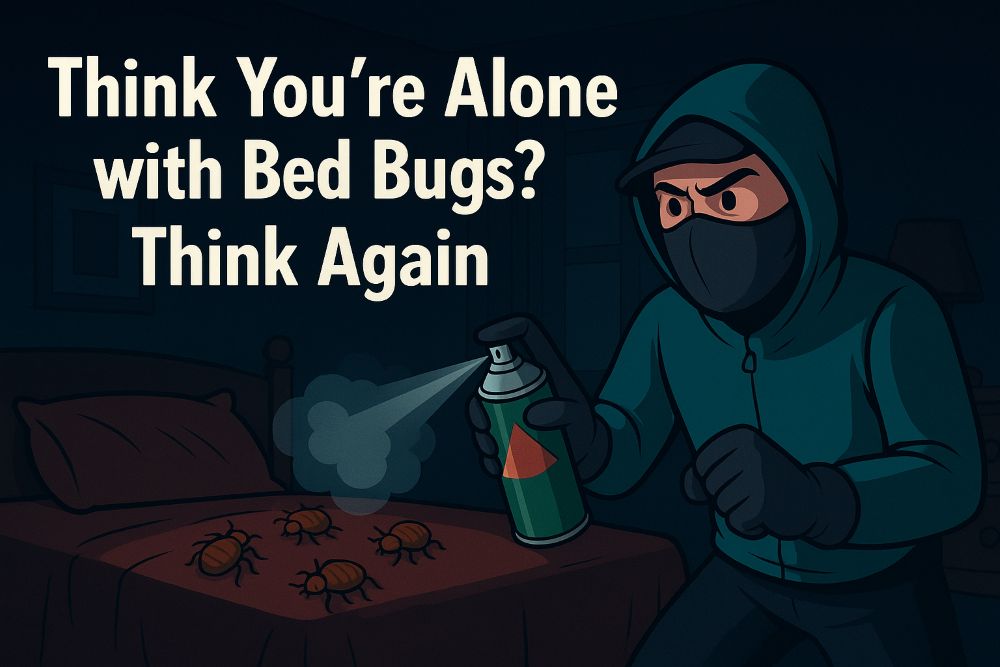
Author: Mark Ainely | Partner GC Realty & Development & Co-Host Straight Up Chicago Investor Podcast
Bed bug infestations remain one of the most frustrating and ongoing problems faced by rental property owners in Chicago. These pests not only frustrate tenants but can also threaten your investment, lead to costly extermination bills, and create legal complications if not handled immediately and properly.
In this blog, we’ll explore how to identify, prevent, and manage bed bugs in your Chicago rental property while staying compliant with local ordinances.
Understand Chicago’s Bed Bug Ordinance
Chicago has specific legal requirements surrounding bed bugs. The city passed a comprehensive bed bug ordinance that places a clear burden on property owners to respond quickly and effectively.
Here's what you need to know:
You must provide tenants with a city-approved bed bug information brochure.
If tenants report bed bugs, you are required to hire a licensed pest management professional within 10 days.
Adjacent units must be inspected as well, not just the one with the complaint.
Documentation of all inspections and treatments must be maintained for at least three years.
Failure to comply can result in fines and further legal consequences. Knowing the rules is your advantage.
How to Identify a Bed Bug Infestation Early
Bed bugs are active at night and often difficult to detect until a full infestation is underway. Early detection is essential to preventing widespread issues.
Signs of a bed bug infestation include:
Rust-colored stains or small blood spots on bedding
A sweet, musty odor
Tiny white eggs or molted skins in mattress seams, box springs, or bed frames
Live bed bugs, typically hiding near sleeping areas or other furniture
Tenants are often the first to notice, so clear communication and education on how to spot early signs can make all the difference.
Professional Pest Control Is a Must
Trying to handle a bed bug problem with over-the-counter sprays or DIY methods rarely works. These pests are resilient and multiply quickly. Hiring a licensed pest management professional is critical to effective removal.
Treatment options may include:
Heat treatment
Chemical applications
Multiple follow-up inspections
Professionals will also inspect adjacent units and common areas to stop the spread. Ensure the pest control provider gives you a detailed service report to support your documentation.
Prevention Strategies for Landlords
You can’t prevent tenants from unknowingly introducing bed bugs into your property, but there are things you can do.
There are steps you can take to limit risk:
Seal cracks and openings in baseboards and walls
Install mattress encasements on all rental unit beds
Discourage tenants from bringing in secondhand furniture
Provide written policies on pest prevention in your lease agreements
Educate tenants about bed bug precautions when traveling
Proactive measures don’t just protect your property, they also show tenants that you’re a responsible landlord.
Include Pest Clauses in Your Lease Agreements
A strong lease agreement is one of your best tools for dealing with a bed bug problem.
Include clauses that:
Outline who is responsible for treatment costs, depending on the source of the infestation
Require tenants to report issues immediately
Describe tenant responsibilities during treatment (e.g., laundry, furniture movement)
Provide rules on used furniture and cleanliness standards
Detailed lease agreements help avoid disputes and protect both your property and your rights.
Communicate Clearly with Tenants
When tenants suspect bed bugs, respond immediately and professionally. Let them know what steps you’re taking, what they can expect during treatment, and what they need to do to prepare.
Best practices include:
Issuing notices about inspection dates
Providing written instructions on treatment prep
Offering tips on prevention and reintroduction avoidance
A cooperative tenant is essential for effective treatment, especially since prep often involves cleaning, laundering, and minimizing clutter.
Keep Accurate Records
Whether you manage one unit or dozens, documentation is critical.
Maintain a centralized system where you can log:
Inspection reports
Pest control invoices
Tenant notices and communications
Treatment schedules
Using property management software can make this much easier by organizing records and reminders. Documentation is also essential for defending against potential tenant complaints or legal action.
Prevent Recurrence
It’s important to continue monitoring and prevention efforts, even after successful treatment. Reintroduction is common, especially in multi-family buildings.
These tips can help you avoid potential problems:
Schedule periodic inspections
Install interceptors under the bed legs
Offer tenants education materials during move-in
Make regular communication part of your property management routine
Prevention isn’t a one-time effort; it’s an ongoing part of responsible property management.
Partner with GC Realty & Development for Bed Bug Management Done Right
At GC Realty & Development, we understand how stressful and costly a bed bug infestation can be. That’s why we offer proactive, professional property management services that include vendor coordination, legal compliance, tenant communication, and accurate documentation.
When you work with us, you gain a trusted partner who knows the Chicago market and stays ahead of regulatory requirements, so you can focus on maximizing rental income and keeping your rental property in top condition.
Contact us today to learn how our expert team can protect your property and tenants from issues like bed bugs.
Frequently Asked Questions About Bed Bugs and Rental Properties in Chicago
1. Who is responsible for bed bug treatment in a Chicago rental property?
According to the ordinance passed by the city council, landlords like you are responsible for hiring a licensed pest control company within 10 days of receiving a bed bug complaint. Tenants, however, must cooperate with inspection and treatment. It's important to act immediately to stay compliant with city regulations.
2. Can property management companies handle bed bug issues?
Yes, many property management companies include pest management coordination as part of their services. Experienced firms will have trusted vendors on call and know how to respond in compliance with Chicago’s laws. Partnering with a full-service firm can save you time and reduce liability.
3. How does residential property management help prevent bed bug infestations?
Residential property management professionals can implement proactive measures like tenant education, regular inspections, and sealing potential entry points. A solid prevention strategy from your property manager helps avoid larger infestations and reduces tenant turnover due to pest problems.

 Vendor Portal
Vendor Portal



